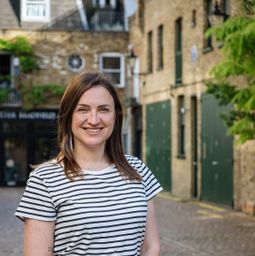
Italian-Brazilian architect living in London and a Ph.D. candidate at the University of São Paulo. She has a Master's Degree in Building Conservation from Politecnico di Milano and a Bachelor's Degree in Architecture and Urbanism from the University of Santa Catarina, Brazil. She is a conservation architectural designer at Thomas Ford & Partners in London, while researching the adaptive reuse of industrial heritage for housing purposes and the urban regeneration of industrial sites.
Sessions in which Rafaela Citron participates
Thursday 1 September, 2022
In the UK and in many other European and Noth American countries, industrial sites have been regenerated over the past decades and turned into vibrant mixed developments, with vacant industrial warehouses being converted into residential units, shops and cultural uses. It is well accepted that these interventions have contributed to the preservation of the tangible industrial heritage, as many buildings have been saved from demolition through adaptive reuse. But there is an intangible side...
Sessions in which Rafaela Citron attends
Sunday 28 August, 2022
A one-day itinerary on the opening day of the conference will allow visitors to discover Exporail in Saint-Constant, the Beauharnois hydroelectric plant and the Cotea...
Join the conference organisers and TICCIH board members for a welcome cocktail and some festive words of introduction, in the former forge of the École technique de Montréal, founded in 1909, now part of the Université du Québec à Montréal campus.
Monday 29 August, 2022
This session presents case studies and policy reviews that contribute to ongoing debate and international dialogue on the role of planning systems and conservation practices in addressing the challenges of citizen engagement—conserving local interests, place attachments alongside physical remnants of industrial heritage. Over the past half century, we have witnessed the development and changing focuses of urban planning and conservation discourses addressing industrial heritage. Relevant p...
This roundtable will examine innovative and creative pedagogical approaches and partnerships that have created opportunities for experiential learning and community engagement, while enabling successful delivery of programs and courses in industrial heritage. In recent years and with the ongoing situation with the COVID-19 pandemic, undoubtedly online and distance teaching and learning are a top priority. The discussions will offer an analytical dialogue on digital learning strategies and ...
In a traditional Quebec sugar shack atmosphere, enjoy a maple taffy rolled on snow in the purest tradition, accompanied by music of the occasion!
Si la vallée du canal de Lachine a été le berceau de l’industrialisation canadienne, la géographie industrielle métropolitaine ne s’y est pas confinée, peu s’en faut, Outre les grandes concentrations d’entreprises des quartiers centraux, elle est constituée des réseaux infrastructuraux, d’une douzaine de centrales hydroélectriques et des ensembles manufacturiers disséminés dans une quinzaine de petites villes aujourd’hui intégrées dans l’aire métropolitaine. La conférence proposera un surv...
Join us for an informal continuation of the discussion started with the public lecture.A drink will be offered to the first fifteen people.
Tuesday 30 August, 2022
This session focuses on company towns from the perspective of urban planning. “Company towns” are here defined as single-enterprise planned communities, usually centered around a single industry, where a company commissions an urban plan, builds housing for its workers, and sets up recreational, commercial, institutional or community facilities. While these are now endangered by a second wave of deindustrialization, we observe that, aside studies or monographs of individual towns that popu...
Drawing on case studies from diverse social, cultural, and political contexts the papers in this session discuss the different responses to maintaining and assessing not only the physical sustainability of industrial heritage but also the sustainability of its social values and meaning.
As a "continent” country, in which industrialization began as early as the 19th century, Canada has seen through deindustrialization and urban redevelopment, parts of this heritage have been either altered or destroyed. Yet, Canada still possesses a very significant industrial heritage. With Canada being a confederation, approaches to the protection and the safeguard of its industrial heritage differs throughout the provinces and territories of the country. The same is true of i...
Drawing on case studies from diverse social, cultural, and political contexts the papers in this session discuss the different responses to maintaining and assessing not only the physical sustainability of industrial heritage but also the sustainability of its social values and meaning.
Efforts to preserve industrial heritage occurs in a socio-economic and political context. But what is being preserved and for whom? And, relatedly, what is the relationship between industrial heritage sites and the deindustrialized working-class communities that often adjoin them? The keynote will consider the ways that the preservation of Montreal’s Lachine Canal, Canada’s premier industrial heritage site, has enabled gentrification processes that have forc...
Join us for an informal continuation of the discussion started with the public lecture.A drink will be offered to the first fifteen people.
Wednesday 31 August, 2022
Examples from several continents, in Europe, South America, North America, Turkey, show strong continuity in the objectives that govern the reuse of industrial buildings, for example the concern to take into account the industrial heritage as a resource for urban and territorial development, or the close links that it has with culture, whether it is used to house cultural facilities or more simply to bear witness to the history and memory of the place. Increasingly, policies for the reuse ...
In this roundtable we will resume and discuss main ideas and findings from the regular session on "Reinterpreting industrial heritage from a global perspective", which will be held in 7 slots from Monday through to Wednesday morning. During these days, we will deepen the discussion between the session’s participants and other colleagues, while spending time together on the congress’ floors and doorsteps. In addition, we can build on previous reflections some of us shared dur...
The role of industrial heritage in urban development has been extensively acknowledged in guiding and legitimizing the policies and discourses implemented by governments mostly to ensure the continuity between the past, present and future. Mega-events such as sports (e.g. Olympics, World Cup, etc.), cultural (Universal Expositions and national Exhibitions), economic (trade and technology fairs) events are often opportunities used in a top-down process to reinforce the mobilization of the i...
The Soulanges Canal is an infrastructure, located on the north shore of the St. Lawrence, which was opened to maritime traffic in 1900, succeeding the "old canal" of Beauharnois (established since 1843 on the north shore of the St. Lawrence). The Soulanges Canal was abandoned in 1959, when the current St. Lawrence Seaway linking the Great Lakes to the Atlantic opened.The Soulanges Canal was designed by the engineer Thomas Monro (1831-1903). Of Irish origin but trained in civil engin...
This session addresses a perpetuating disjunction between conceptualisation of heritage and heritage making in heritage studies vis-a-vis heritage management and conservation of industrial heritage sites. There is an inevitable impact of this disjunction on advancing policy in people- and place-centred approaches to heritage futures. This session aims to explore ways in which tangible and intangible traces of the past can be utilised creatively in shaping desirable places to dwell and work...
In this lecture, I would like to talk about deindustrialised communities, heritage and memory in the context of right-wing populism. Drawing on studies of memory and heritage, I argue that right-wing populists have cornered the market on talking about the past of deindustrialised communities. They have successfully misrepresented this rich and complex history to fuel rage, resentment, fear and reactionary nostalgia. Indeed, ‘the past’, and in particular the industr...
Join us for an informal continuation of the discussion started with the public lecture.A drink will be offered to the first fifteen people.
Thursday 1 September, 2022
From its construction to its restoration, immerse yourself in the now and then of this key Canadian industrial heritage site. A country’s central maritime route, a major inland port, the Canadian Lowell (using hydraulic power), the cradle of industrialization, Smokey Valley (using steam), a manufacturing hotspot, the Lachine Canal is all of this and more. For it is also a national historic site, for which
Examples from several continents, in Europe, South America, North America, Turkey, show strong continuity in the objectives that govern the reuse of industrial buildings, for example the concern to take into account the industrial heritage as a resource for urban and territorial development, or the close links that it has with culture, whether it is used to house cultural facilities or more simply to bear witness to the history and memory of the place. Increasingly, policies for the reuse ...
The proposed session will examine the unfolding relationship between industrial heritage and those left behind in adjoining deindustrialized working-class areas. The four papers seek to understand the socio-economic and political impact of recognizing the industrial past in the present. Two guiding questions will be asked. Can industrial heritage support those ‘left behind’ in deindustrialized areas where nothing, or very little, has filled the economic or cultural vacuum? Has industrial h...
This lecture will argue that the landscapes of industrial heritage that can be found in different parts of the world are directly related to the place-specific trajectories of deindustrialization. In other words: the different ways in which deindustrialization impacts on local communities has a direct bearing on the emergence of forms of industrial heritage. I will differentialte between deindustrialization paths and related industrial heritage regimes in a) Anglo-...
Friday 2 September, 2022
Walkers will meet at the entrance (there is only one) of Lionel Groulx Metro and from there walk along the canal to the St-Gabriel Locks. This was once the most heavily industrialized area in Canada. It is now a zone of affluence between the hardscrabble, but now gentrifying, Point Saint-Charles, historically Irish and French, and Little Burgundy, one of Montreal's first multi-racial neighbourhoods. Several former factories were converted into condominiums in the...
In this meeting, TICCIH representatives from around the world will present work in the field of industrial heritage in their respective countries. The presentations are based on the national reports that TICCIH has gathered for the 2022 World Congress, but may emphasize particular matters. These can range across several fields where industrial heritage plays a role – from academic research and other forms of knowledge production, to heritage management a...
In this meeting, TICCIH representatives from around the world will present work in the field of industrial heritage in their respective countries. The presentations are based on the national reports that TICCIH has gathered for the 2022 World Congress, but may emphasize particular matters. These can range across several fields where industrial heritage plays a role – from academic research and other forms of knowledge production, to heritage management a...
In the refusal of people in communities abandoned by industrial capital to abandon their own places, we can read an implicit critique of the mobility and unaccountability of capital, raised by those who were once inside (however tenuously or uncomfortably) and now find themselves marginalized, “left behind.” The desire to catch up again, whether through attracting new investment or transvaluing abandoned sites as tourist attractions, makes this an essentially conservative critique that is ...
Come and share the good times of the congress and celebrate your scientific and professional discoveries in a former fruit jam factory, Usine C, built in 1913 and transformed at the end of the 1970s into a place for creation and dissemination.Discover Montreal's gastronomy thanks to an exceptional caterer. Learn about Montreal's musical heritage and the history of the industrial district that brought it to life. Then hear and experience Quebec's musical tradition as you are carried ...
Saturday 3 September, 2022
Uncover the vestiges of the Canadian Pacifie Railway tracks and the former Angus Shops, which played integral raies in the industrial and residential development of Rosemont. This tour wi/1 give you insight into the industrial past of the neighbourhood and its new life bath as a place to live and to work.A tour designed and guided by Heritage Montreal. Departure at the corner of Rachel and Dézéry streets, 10 minutes walk from Prefontaine metro station










